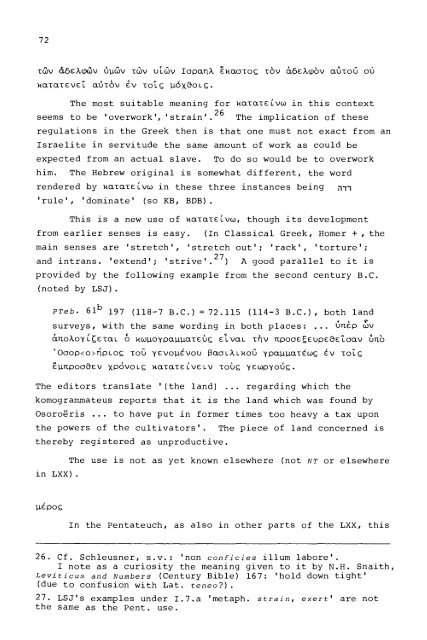A Lexical Study of the Septuagint Version of the Pentateuch
A Lexical Study of the Septuagint Version of the Pentateuch
A Lexical Study of the Septuagint Version of the Pentateuch
Create successful ePaper yourself
Turn your PDF publications into a flip-book with our unique Google optimized e-Paper software.
τών αδελφών υμών τών υιών Ισραήλ έκαστος τόν άδελφόν αυτού ού<br />
κατατενεΐ αυτόν έν τοις μόχθοι ς.<br />
The most suitable meaning for κατατείνω in this context<br />
2 6<br />
seems to be 'overwork', 'strain'. The implication <strong>of</strong> <strong>the</strong>se<br />
regulations in <strong>the</strong> Greek <strong>the</strong>n is that one must not exact from an<br />
Israelite in servitude <strong>the</strong> same amount <strong>of</strong> work as could be<br />
expected from an actual slave. To do so would be to overwork<br />
him. The Hebrew original is somewhat different, <strong>the</strong> word<br />
rendered by κατατείνω in <strong>the</strong>se three instances being rm<br />
'rule', 'dominate' (so KB, BDB).<br />
This is a new use <strong>of</strong> κατατείνω, though its development<br />
from earlier senses is easy. (In Classical Greek, Homer + , <strong>the</strong><br />
main senses are 'stretch', 'stretch out'; 'rack 1<br />
,<br />
27<br />
'torture';<br />
and intrans. 'extend'; 'strive'. ) A good parallel to it is<br />
provided by <strong>the</strong> following example from <strong>the</strong> second century B.C.<br />
(noted by LSJ).<br />
PTeb. 61 b<br />
197 (118-7 B.C.) =72.115 (114-3 B.C.), both land<br />
surveys, with <strong>the</strong> same wording in both places: ... υπέρ ών<br />
άπολογιζεται ο κωμογραμματεύς είναι τήν προσεξευρεθεισαν ύπό<br />
Όσορηριος τού γενομένου βασιλικού γραμματέως έν τοίς<br />
έμπροσθεν χρόνοις κατατείνειν τούς γεωργούς.<br />
The editors translate '[<strong>the</strong> land] ... regarding which <strong>the</strong><br />
komogrammateus reports that it is <strong>the</strong> land which was found by<br />
Osoroëris ... to have put in former times too heavy a tax upon<br />
<strong>the</strong> powers <strong>of</strong> <strong>the</strong> cultivators'. The piece <strong>of</strong> land concerned is<br />
<strong>the</strong>reby registered as unproductive.<br />
in LXX) .<br />
μέρος<br />
The use is not as yet known elsewhere (not NT or elsewhere<br />
In <strong>the</strong> <strong>Pentateuch</strong>, as also in o<strong>the</strong>r parts <strong>of</strong> <strong>the</strong> LXX, this<br />
26. Cf. Schleusner, s.v.: 'non confides ilium labore ' .<br />
I note as a curiosity <strong>the</strong> meaning given to it by N.H. Snaith,<br />
Leviticus and Numbers (Century Bible) 167: 'hold down tight'<br />
(due to confusion with Lat. teneo?) .<br />
27. LSJ's examples under I.7.a 'metaph. strain, exert' are not<br />
<strong>the</strong> same as <strong>the</strong> Pent. use.

















